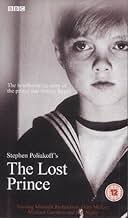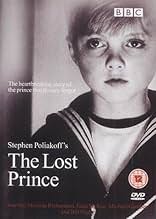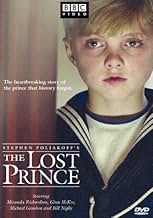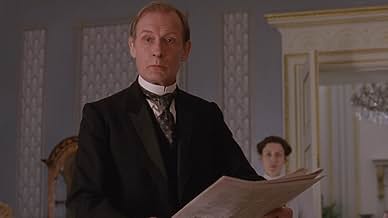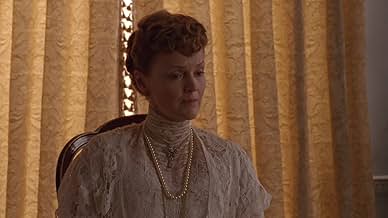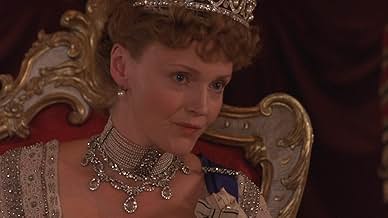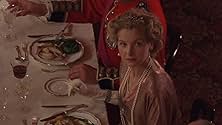IMDb RATING
7.6/10
2.2K
YOUR RATING
The story of Prince John, the autistic and epileptic youngest son of Queen Mary and King George V, who spent his whole life hidden away from public view and died at the age of 13 in 1919.The story of Prince John, the autistic and epileptic youngest son of Queen Mary and King George V, who spent his whole life hidden away from public view and died at the age of 13 in 1919.The story of Prince John, the autistic and epileptic youngest son of Queen Mary and King George V, who spent his whole life hidden away from public view and died at the age of 13 in 1919.
- Won 3 Primetime Emmys
- 8 wins & 21 nominations total
Browse episodes
Featured reviews
This lavish production, uses the vehicle of the short life "The Lost (from history) Prince" to portray what Royal Life was like at the turn of century. The sumptuous production illustrates the splendour, luxury, misery and ultimately the futility of the Royals. There are wonderful images of the beautiful daughters of the tsar. Epileptic Prince John is however seen as the only one as being allowed to be himself. Wonderful performances of the roles of the ice queen Queen Mary, Lalla the nursemaid, Prince John young and old.Has been criticised for being too long, but you must try and get to see this when it comes to your country.
Historical facts, Prince John died aged 14 isolated from his family in a farmhouse at Sandringham? cared for by Lalla Bill. Only one historical reference to him still existed. The height of George V is still a secret.
Historical facts, Prince John died aged 14 isolated from his family in a farmhouse at Sandringham? cared for by Lalla Bill. Only one historical reference to him still existed. The height of George V is still a secret.
10Alex-372
The Lost Prince is a beautiful costume drama from Stephen Poliakoff, about the young brother of prince George, who nobody wanted to talk about and who was most likely autistic and most definitely epileptic, diseases respectively unknown and misunderstood at the time.
This story is roughly told through his eyes, and describes in beautiful detail the transition of Europe from a continent ruled by related monarchs (many of them Saxe-Coburg and Gotha), until the end of this system during and after WWI. As important historical events manage to find their way into palace life (the suffragette movement, the rise of ordinary people as politicians, the telephone and the motor car), they more often seem like foreign intrusions into the world of the palace.
As this is seen through the eyes of the little boy, there is very little value judgement as to whether this system was a right or just one, and at the end you are struck with the horror of the murder of the tsarist family and their beautiful daughters, but we never see the reign of terror they themselves and their secret police visited upon Russia.
There is a very funny incident when the tsarina during a visit to what she sees as her poor cousins estates, refuses to walk any further, because she has the "wrong shoes" for walking in the grass. Later, she remarks how "close" the houses of "other people" are and you can't help conclude she was simply afraid of being killed by the proletariat. :-)
Very well acted by Miranda Richardson (Blackadder), Michael Gambon, Tom Hollander, Gina McKee as the governess Lalla but especially by the two child actors who play Johnny. They look like great kids rather than brats.
Highly recommended if you can catch this on the BBC or HBO.
This story is roughly told through his eyes, and describes in beautiful detail the transition of Europe from a continent ruled by related monarchs (many of them Saxe-Coburg and Gotha), until the end of this system during and after WWI. As important historical events manage to find their way into palace life (the suffragette movement, the rise of ordinary people as politicians, the telephone and the motor car), they more often seem like foreign intrusions into the world of the palace.
As this is seen through the eyes of the little boy, there is very little value judgement as to whether this system was a right or just one, and at the end you are struck with the horror of the murder of the tsarist family and their beautiful daughters, but we never see the reign of terror they themselves and their secret police visited upon Russia.
There is a very funny incident when the tsarina during a visit to what she sees as her poor cousins estates, refuses to walk any further, because she has the "wrong shoes" for walking in the grass. Later, she remarks how "close" the houses of "other people" are and you can't help conclude she was simply afraid of being killed by the proletariat. :-)
Very well acted by Miranda Richardson (Blackadder), Michael Gambon, Tom Hollander, Gina McKee as the governess Lalla but especially by the two child actors who play Johnny. They look like great kids rather than brats.
Highly recommended if you can catch this on the BBC or HBO.
BBC1's 'The Lost Prince' is one of the best television dramas that the channel has shown for a long time. The story of King George V's youngest son, Johnnie, the programme explores the boy's learning difficulties and his autism-related problems, as well as the horrors of war as seen through the eyes of the Royal family.
Those are the facts, but the drama is so much more than a re-telling of a royal story. Moments of poignancy, such as Johnnie's frank but heartbreaking honesty with his parents, are touching without becoming schmaltzy or obvious, and the harsh burden of the First World War on the British keeps the drama well within reality.
Good performances all around, particularly from Miranda Richardson as Queen Mary and Tom Hollander as King George, who invoke sympathy from their seemingly impassive facades. Bill Nighy is excellent as the King's adviser, Stamfordham, and the children - especially Rollo Weeks -are more than capable of carrying such a difficult and weighty subject.
Those are the facts, but the drama is so much more than a re-telling of a royal story. Moments of poignancy, such as Johnnie's frank but heartbreaking honesty with his parents, are touching without becoming schmaltzy or obvious, and the harsh burden of the First World War on the British keeps the drama well within reality.
Good performances all around, particularly from Miranda Richardson as Queen Mary and Tom Hollander as King George, who invoke sympathy from their seemingly impassive facades. Bill Nighy is excellent as the King's adviser, Stamfordham, and the children - especially Rollo Weeks -are more than capable of carrying such a difficult and weighty subject.
This short drama focused on the epileptic Prince John, son of George V and Queen Mary, and brother to the present Queen Elizabeth's father, George VI.
We see the story of John from the perspectives of himself and of his nurse, Lalla (the emotionless Gina McKee). As he becomes more out of control and an embarrassment to his family, the little boy becomes more special to the viewer. Johnny is a crank but a lovable one.
Daniel Williams and Matthew Thomas both make an impact as Prince John at different ages, while Tom Hollander and Miranda Richardson are excellent as his repressed and bewildered parents. There's also key roles of interest for Bill Nighy (Stamfordham), Frank Finlay (the PM, Herbert Asquith), and David Barrass (Kaiser Bill).
Aside from the problems accorded by John's illness and confinement, we also see how events unfold in Russia for George V's cousins, the ill-fated Romanov family.
'The Lost Prince' is another winner for writer/director Stephen Poliakoff, and well worth your time. Enjoyable whether you know the story or the intricacies of the Royal family, or not.
We see the story of John from the perspectives of himself and of his nurse, Lalla (the emotionless Gina McKee). As he becomes more out of control and an embarrassment to his family, the little boy becomes more special to the viewer. Johnny is a crank but a lovable one.
Daniel Williams and Matthew Thomas both make an impact as Prince John at different ages, while Tom Hollander and Miranda Richardson are excellent as his repressed and bewildered parents. There's also key roles of interest for Bill Nighy (Stamfordham), Frank Finlay (the PM, Herbert Asquith), and David Barrass (Kaiser Bill).
Aside from the problems accorded by John's illness and confinement, we also see how events unfold in Russia for George V's cousins, the ill-fated Romanov family.
'The Lost Prince' is another winner for writer/director Stephen Poliakoff, and well worth your time. Enjoyable whether you know the story or the intricacies of the Royal family, or not.
This is a truly wonderful production with brilliant, almost surreal touches that lift this drama about the crowd.
I would love to know if any of Prince John's drawings survived. They had, or at least the ones used for the film had a Chagal-like quality that was both very graceful and artistic and filled with insite as to the inner character of the subjects. "The Tsar Swimming" and "Fat Mary" are two example. His father wearing a crown far too big for his head is a masterpiece.
I also wonder if Prince John wasn't a savant. His drawings were exceptional and far ahead of his time and his musical ability was,(if the film properly portrayed this talent)quite remarkable.
What is wonderful about this film is the sense that John despite everything managed to form his own little community on his "Estate", surrounded by people who really did love him. I also have the feeling that he was quite a happy child most of the time.
His parents were no worse than other Royal parents and a great deal better than most.
Special mention should be made of the marvelous Bibi Anderson who played Queen Alexandra so perfectly. At the funeral she even managed to look almost exactly like the Dowager Queen.
Someone mentioned that they didn't believe that the Tsar and the Tsarina would have acted as coldly toward their relations when visiting at Cowes. Unfortunately, that's just how they acted. They did believe that they were seated higher at the table of the Rulers of the World than their cousins in England who had to make-do with smaller versions of their own vast palaces in St. Petersburg. After all the Tsar was the last Absolute Monarch in the world. He even had to approve of every marriage and every divorce. No decision could be made unless he gave his approval. His cousin George had to actually deal with a rabble of advisors and that intrusive Parliment.
The scenes of the Tsar swimming were especially out of touch with reality, just as the Tsar was out of touch with the reality of his situation.
The Russian Grand Duchesses were so dream-like in their lovely summer laces and huge flower-like hats. All of John's imagined scenerios were touched with this combination of wistfullness and joy.
I mention these things because they haven't been mentioned before and they are what I will bring with me forever. Those haunting images of the children running on the beach, the flower-hats in the flower-garden and John peeking through the rails of the balcony at the beautiful lady at the banquet who smiles and waves back at him...a small and precious moment to be treasured.
See this film and fall in love with a child that refuses to be "Lost".
I would love to know if any of Prince John's drawings survived. They had, or at least the ones used for the film had a Chagal-like quality that was both very graceful and artistic and filled with insite as to the inner character of the subjects. "The Tsar Swimming" and "Fat Mary" are two example. His father wearing a crown far too big for his head is a masterpiece.
I also wonder if Prince John wasn't a savant. His drawings were exceptional and far ahead of his time and his musical ability was,(if the film properly portrayed this talent)quite remarkable.
What is wonderful about this film is the sense that John despite everything managed to form his own little community on his "Estate", surrounded by people who really did love him. I also have the feeling that he was quite a happy child most of the time.
His parents were no worse than other Royal parents and a great deal better than most.
Special mention should be made of the marvelous Bibi Anderson who played Queen Alexandra so perfectly. At the funeral she even managed to look almost exactly like the Dowager Queen.
Someone mentioned that they didn't believe that the Tsar and the Tsarina would have acted as coldly toward their relations when visiting at Cowes. Unfortunately, that's just how they acted. They did believe that they were seated higher at the table of the Rulers of the World than their cousins in England who had to make-do with smaller versions of their own vast palaces in St. Petersburg. After all the Tsar was the last Absolute Monarch in the world. He even had to approve of every marriage and every divorce. No decision could be made unless he gave his approval. His cousin George had to actually deal with a rabble of advisors and that intrusive Parliment.
The scenes of the Tsar swimming were especially out of touch with reality, just as the Tsar was out of touch with the reality of his situation.
The Russian Grand Duchesses were so dream-like in their lovely summer laces and huge flower-like hats. All of John's imagined scenerios were touched with this combination of wistfullness and joy.
I mention these things because they haven't been mentioned before and they are what I will bring with me forever. Those haunting images of the children running on the beach, the flower-hats in the flower-garden and John peeking through the rails of the balcony at the beautiful lady at the banquet who smiles and waves back at him...a small and precious moment to be treasured.
See this film and fall in love with a child that refuses to be "Lost".
Did you know
- TriviaKing George V had six children, two of whom used the name George. His second son was Prince Albert Frederick Arthur George, known to the family as Bertie, who became King George VI. He had a bad stutter that began in early childhood and lasted into adulthood. His third son, Johnnie's closest sibling in this movie, was Prince George, Duke of Kent. He grew up to live a life that was considered scandalous, and died in a plane crash in 1942.
- GoofsWhen the Romanovs are in England, Alexandra speaks English with a Russian accent. In real life, Alexandra was a German princess raised in England by her grandmother, Queen Victoria. She spoke English with a British accent.
- Quotes
Prince George: [Speaking about Prince John] He was the only one of us who was able to be himself.
- ConnectionsFeatured in Masterpiece Theatre: The Lost Prince: Part 1 (2004)
- SoundtracksRondo for Glass Armonica
(uncredited)
Composed by Joseph Schmittbauer (as J.A. Schmittbauer)
(Queen Alexandra's birthday cake)
Details
- Release date
- Countries of origin
- Official sites
- Language
- Also known as
- 失落的王子
- Filming locations
- Black Park Country Park, Black Park Road, Wexham, Buckinghamshire, England, UK(Russian lake, royal car)
- Production companies
- See more company credits at IMDbPro
Contribute to this page
Suggest an edit or add missing content

